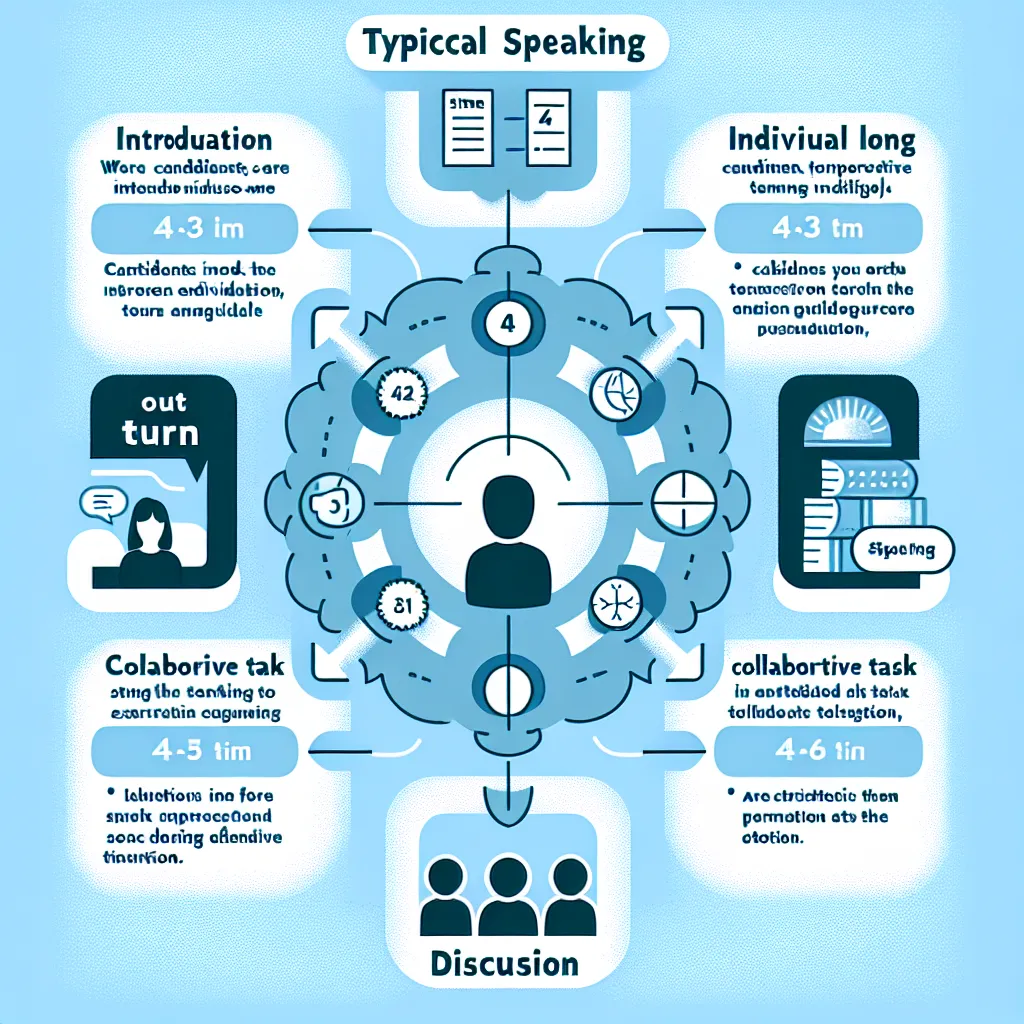Are you preparing for the Cambridge English exams and looking for effective ways to improve your speaking skills online? In this comprehensive guide, we’ll explore the best strategies and resources for practicing Cambridge Speaking online, helping you boost your confidence and performance in the exam.
Understanding the Cambridge Speaking Exam
Before diving into practice methods, it’s crucial to understand the structure and requirements of the Cambridge Speaking exam. This knowledge will help you focus your practice efforts more effectively.
Components of the Cambridge Speaking Exam
The Cambridge Speaking exam typically consists of four parts:
- Introduction and interview
- Individual long turn
- Collaborative task
- Discussion
Each part assesses different aspects of your speaking abilities, including fluency, pronunciation, vocabulary, and interactive communication.
 Cambridge Speaking Exam Components
Cambridge Speaking Exam Components
Best Online Practices for Cambridge Speaking
Now that we understand the exam structure, let’s explore the most effective ways to practice Cambridge Speaking online.
1. Utilize Official Cambridge English Resources
Cambridge English provides a wealth of online resources to help you prepare for the speaking exam:
- Cambridge English YouTube Channel: Offers sample speaking tests and expert advice.
- Cambridge English Website: Provides practice tests and preparation materials.
- Cambridge English Apps: Interactive apps designed to improve your speaking skills.
These official resources ensure that your practice aligns closely with the actual exam format and expectations.
2. Join Online Speaking Groups
Participating in online speaking groups can significantly enhance your speaking skills:
- Language Exchange Websites: Platforms like Tandem or HelloTalk connect you with native English speakers.
- Online Study Groups: Join or create study groups on platforms like Discord or Skype.
- Virtual Conversation Clubs: Participate in organized conversation sessions focused on exam preparation.
Regular interaction with others helps improve your fluency and builds confidence in speaking English.
3. Use AI-Powered Speaking Practice Tools
Artificial Intelligence has revolutionized language learning, offering personalized speaking practice:
- ELSA Speak: Provides instant feedback on pronunciation and intonation.
- SpeakingPal: Offers interactive speaking lessons with speech recognition technology.
- Duolingo: While not specific to Cambridge exams, its speaking exercises can be beneficial for general practice.
These tools allow you to practice speaking at your own pace and receive immediate feedback.
4. Record and Analyze Your Speaking
Self-assessment is a powerful tool for improvement:
- Use voice recording apps to record your responses to sample questions.
- Listen to your recordings and identify areas for improvement.
- Compare your responses to sample answers provided by Cambridge English.
This practice helps you become more aware of your speaking patterns and areas needing attention.
5. Schedule Online Sessions with a Tutor
Working with a professional tutor can provide targeted practice and feedback:
- iTalki: Connects you with professional English tutors for one-on-one sessions.
- Verbling: Offers lessons with certified English teachers experienced in exam preparation.
- Preply: Allows you to find tutors specializing in Cambridge exam preparation.
A tutor can provide personalized guidance and simulate the exam experience more accurately.
 Online English Tutoring Session
Online English Tutoring Session
6. Engage in Mock Exams
Participating in mock exams is crucial for building confidence and familiarity with the exam format:
- Use online platforms that offer simulated Cambridge Speaking tests.
- Practice with a study partner, taking turns as the examiner and candidate.
- Time yourself to ensure you’re comfortable with the pace of each exam section.
Regular mock exams help reduce anxiety and improve your performance under exam conditions.
7. Expand Your Vocabulary with Online Tools
A rich vocabulary is essential for success in the Cambridge Speaking exam:
- Use apps like Quizlet or Memrise to learn and review exam-specific vocabulary.
- Follow English language learning accounts on social media for daily vocabulary tips.
- Read English news websites and practice using new words in your speaking exercises.
Regularly incorporating new vocabulary into your speaking practice will enhance your overall performance.
Important Tips for Online Cambridge Speaking Practice
As you engage in online practice, keep these key points in mind:
- Consistency is Key: Regular practice, even if brief, is more effective than infrequent, lengthy sessions.
- Focus on Weak Areas: Identify your weaknesses and dedicate extra time to improving them.
- Mimic Exam Conditions: When practicing, try to recreate the exam environment as closely as possible.
- Embrace Feedback: Be open to constructive criticism and use it to guide your improvement.
- Stay Updated: Regularly check the official Cambridge English website for any updates or changes to the exam format.
Next Steps in Your Cambridge Speaking Preparation
Now that you’re equipped with strategies for online practice, consider these next steps:
- Create a study schedule incorporating various online practice methods.
- Set specific, measurable goals for your speaking improvement.
- Find a study partner or group for regular online speaking practice.
- Book a mock exam with a professional tutor to assess your current level.
- Review and update your study plan based on your progress and feedback.
Remember, effective preparation for the Cambridge Speaking exam requires a combination of structured practice, self-assessment, and real-time interaction. By utilizing these online resources and strategies, you’ll be well on your way to success in your Cambridge Speaking exam.
We encourage you to share your experiences with online speaking practice in the comments below. What strategies have worked best for you? Do you have any additional tips for fellow learners? Your insights could be invaluable to others preparing for their Cambridge Speaking exam!




